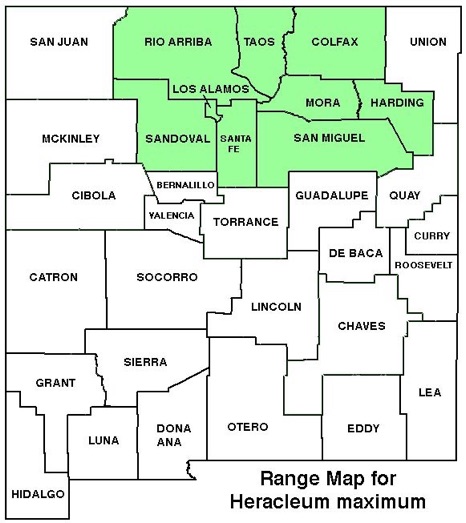WILDFLOWERS OF NEW MEXICO

With robust stems reaching 8-feet tall and huge leaves, it’s obvious why the scientific name refers to Hercules. Note the leaves with 3 broad lobes and the umbrella-shaped clusters of small, white flowers. CAUTION–the foliage contains caustic sap that can cause a sun-sensitive rash and blisters.
FLOWERS: June–August. Round to flat-topped clusters, 4–12-inches wide (10–30 cm), umbrella-shaped with 12–30 rays up to 5-inches long (12 cm); flowers with 5 notched petals to 3/8-inch long (9 mm), those on the outer edge of the umbel often noticeably larger and deeply notched.
LEAVES: Alternate. Leaves with stems (petioles) 4–16-inches long (10–40 cm), hollow, hairy, sheathing the plant stem; palmate with 3 large leaflets 4–12-inches (10–30 cm) long and wide, with pointed lobes, lower surface thinly woolly, margins toothed.
HABITAT: Moist sandy, gravelly soils, mountain streams, wet meadows, shady areas, roadside ditches; aspen, spruce-fir forests.
ELEVATION: 7,100–10,400 feet.
RANGE: Widespread in mountainous regions of North America.
SIMILAR SPECIES: Water Parsnip (Sium suave) and Water Hemlock (Cicuta maculata), in similar range and habitats, also have umbrella-shaped clusters (umbels) of small white flowers but both have pinnately compound leaves with narrow leaflets along midrib.
NM COUNTIES: Northern mountains in high-elevation moist habitats: Colfax, Harding, Los Alamos, Mora, Rio Arriba, San Miguel, Sandoval, Santa Fe, Taos.

COW PARSNIP
HERACLEUM MAXIMUM
Parsley family, Apiaceae
Perennial herb

THE CONTENTS OF THIS WEBSITE ARE COPYRIGHTED AND CANNOT BE USED
WITHOUT PERMISSION OF GEORGE OXFORD MILLER





EMAIL ME